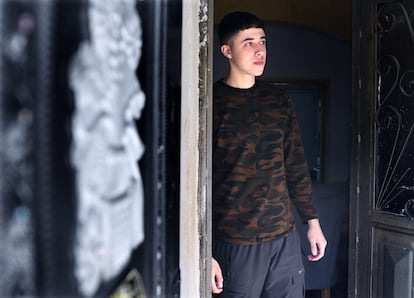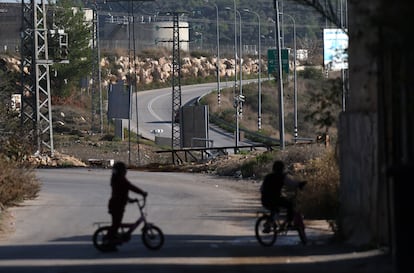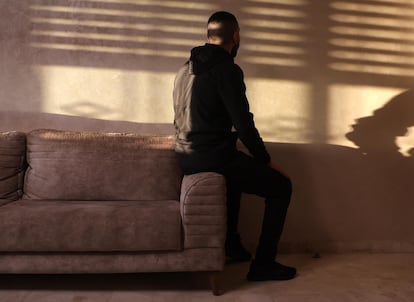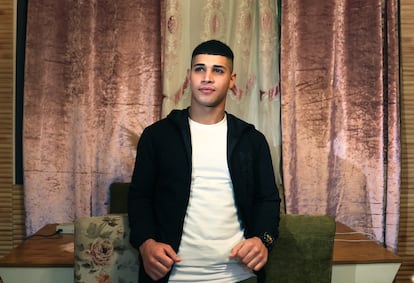Palestinian minors imprisoned in Israel: ‘Sooner or later I was going to lose my mind’
Israel is the only state in the world that systematically tries children and adolescents in military courts, according to UNICEF. The vast majority say they suffered physical or psychological abuse and many remain detained without charge


Wisam Tamimi turned 17 on June 6. Three days later, 50 Israeli soldiers broke into his house at dawn and took him away with his hands cuffed behind his back. He was blindfolded and verbally abused. Once at a military post in the West Bank, soldiers forced him to kneel. He remained like this for five hours, he explains in his home in Nabi Salih, about 12 miles from the capital of the West Bank, Ramallah. They had taken off his jacket and he was cold, he remembers. He was then taken to the high-security Israeli Ofer prison, near Ramallah, where he was stripped completely naked and searched, before being placed in solitary confinement for five days. In all that time, he only saw Israelis officers, who interrogated him “from 11 in the morning until nine or 10 at night.” Food was “very scarce” and the threats were constant. He was repeatedly told that if he didn’t confess, the Israeli army would demolish his parents’ house. They wanted him to sign some papers in Hebrew that he didn’t understand.
Wisam is one of the 171 teenagers released from prison as part of the short-lived Gaza ceasefire agreement, according to Abdallah Zgari, president of the NGO Palestinian Prisoners Club. The majority (107) are minors aged between 14 and 17. The remaining 64 are now 18 years old, but were still minors when they were arrested. Three out of four of these young people have not been convicted of any crime, according to official Israeli data.
In addition to those first five days in isolation, Wisam spent another 35 days alone in the Al Masqubiyya interrogation center in Jerusalem, in a cell where he says he could barely stand up (he is 1.83 meters tall) or take more than three steps. It was then — in that long solitary month, subjected to constant interrogations and in a cell with a constantly flickering light — that he told himself that “sooner or later I was going to lose his mind.”
Before the October 7 attack, when Hamas killed 1,200 people in Israel, at least 250 Palestinian teenagers were imprisoned in Israeli prisons, Zgari explains by phone. After the hostage exchange in Gaza, around 80 minors remain in Israeli jails, according to the Palestinian Prisoners Club. In the eight weeks since the start of the war in the Gaza strip, another 800 have been detained at some point, although most have since been released, Zgari says.
Military jurisdiction is applied to Palestinian minors in Israeli prisons, whether in the occupied West Bank or East Jerusalem. When they are tried, which often does not happen, they appear before military courts whose conviction rate is more than 99%, according to the U.S. Department of State. Military courts only try Palestinian minors. In the extremely rare case that a Jewish minor is detained, civil law — which offers more protections — is applied.
“Palestinian children can be arrested anywhere, at checkpoints, on the way to school, during operations in cities and camps or even in their own beds,” explains Francesca Albanese, the U.N. Special Rapporteur on Human Rights in the Occupied Territories of Palestine. Since 2000, 13,000 Palestinian minors have been detained, interrogated, tried and imprisoned in Israel, according to UNICEF data cited by the NGO Defense for Children International (DCI) in Palestine.
In 1991, Israel ratified the U.N. Convention on the Rights of the Child, which stipulates that minors should only be deprived of their liberty as an exceptional measure, should not be detained unlawfully or arbitrarily and should not be subjected to torture or other cruel, inhumane or degrading treatment or punishment. The reality, however, as explained in the 2020 Defenceless report by the NGO Save The Children, is that Israel sentences 99% of Palestinian children tried by military courts to prison, even though the U.N. considers it “a last resort.”
Save The Children interviewed 470 children, incarcerated between the ages of 10 and 17, to prepare this document. Almost one in four reported “punching, slapping, pushing or kicking” during their arrest. Once detained, “81% were physically beaten at least once and 43% were beaten numerous times,” 88% did not receive the health care they needed, and 46% were deprived of food and water. More than half were threatened during interrogations that their families would be harmed, and 73% had to sign documents in Hebrew. None of these minors were assisted by a lawyer during interrogations. “A smaller number,” the report states, suffered mistreatment such as having “dogs released on them or a bag put over their heads.”
“[Palestinians] are the only children in the world who are systematically prosecuted in military courts, which consistently lack fair trial rights and fail to meet juvenile justice standards,” Save The Children states in the report. In 2013, UNICEF reported that the mistreatment of children in the Israeli military detention system was “widespread, systematic and institutionalized.”
Throwing stones
Wisam’s story is an example of what was documented by the Save The Children report. As in at least one case reported by the NGO, this high school student was detained after being wounded by the Israeli military. Eight days before his arrest, while on the roof of his uncle’s house, he was hit in the head by a rubber bullet, which fractured his skull. His case also exemplifies the accusation that is most often made against Palestinian minors. The young man was going to be accused — the charges were never filed — of crimes such as “planting a land mine,” “possession of weapons and explosives” and, the most common: “stone-throwing,” which is punishable by up to 20 years in prison. Wisam was also going to be charged with “traffic violations.” “I don’t even have a driver’s license,” he laughs.
From Wisam’s house, you can see the road for Jewish settlers that leads to the settlement of Halamish. The violence caused by these illegal settlements, built on land usurped from the Palestinians, is also reflected in the detention and imprisonment of minors. In 2019, the NGO Military Court Watch calculated that Palestinian minors in prison lived an average of 900 meters away from one of these colonies.

Administrative detention
In Ramallah, Ahmed — who prefers not to use his real name for security reasons — shows a mark on his wrist. It is the scar from the plastic cuffs that were bound so tightly around his wrist that “they made me bleed.” Ahmed, 19, was also released in the hostage exchange with Hamas. He was 13 years old when he was arrested for the first time. A large number of soldiers broke into his house at 3 a.m. and took him handcuffed and blindfolded to a military base, he remembers. There, they forced him to strip naked to search him. “I was very scared. I was 13 years old,” he says. He was accused of stone-throwing. He was sentenced to a year in prison, but his family managed to get him out by paying a fine of 12,000 shekels, about $3,200.
In September 2022, he was arrested again. Since the young man, then 17 years old, was not at home, they took his brother. That same day, Ahmed turned himself in. He was again accused of stone-throwing and sentenced to four months in prison. When he was about to complete his sentence, the military court prolonged his imprisonment with six months of administrative detention.

The victims of administrative detention are held without trial and on the basis of supposed evidence that is not revealed to the accused, so the prisoner does not know what they are accused of or when they will be released from prison. This type of detention can be extended every six months an endless number of times. According to Abdallah Zgari, there are about 20 children in administrative detention in Israeli prisons.
Mohamed Abu Ayyash, 18, is another of the Palestinian teenagers in administrative detention who was released in the Hamas hostage exchange. The story he tells from his home in Ramallah is, once again, similar to that of other Palestinian minors: a violent arrest at the age of 17, at dawn and by special forces that “surrounded the house.” The soldiers cuffed his hands with plastic ties — “six, one on top of the other,” he says — and blindfolded him. He was taken to a military base, where he was subjected to a “12-hour” interrogation. He was transferred again, with soldiers dragging him by the cuffs. Behind bars, food was scarce — yogurt, bread and “half a kilo of hummus for 40 prisoners.” He was detained with adults, which is prohibited by international law. Then came the administrative detention. Mohamed was a few days away from completing the last six-month extension when he was released.

This young man was not beaten when he was a minor. This type of abuse began after the Hamas attack, when he was 18 years old, he says. That’s when the Palestinian prisoners were stripped of their “electronic devices, blankets, mattresses, sheets and even clothing.” For 30 days, he remained “in the same pants, a T-shirt and had no underwear,” he explains. During a transfer from Ofer prison to Naqab, another prison in southern Israel, inmates were handcuffed, and then the handcuffs were cuffed to shackles on their ankles. “If they just kicked you, you would be happy,” says the teenager. On the bus, he remembers, “there were several children.”
Sign up for our weekly newsletter to get more English-language news coverage from EL PAÍS USA Edition
Tu suscripción se está usando en otro dispositivo
¿Quieres añadir otro usuario a tu suscripción?
Si continúas leyendo en este dispositivo, no se podrá leer en el otro.
FlechaTu suscripción se está usando en otro dispositivo y solo puedes acceder a EL PAÍS desde un dispositivo a la vez.
Si quieres compartir tu cuenta, cambia tu suscripción a la modalidad Premium, así podrás añadir otro usuario. Cada uno accederá con su propia cuenta de email, lo que os permitirá personalizar vuestra experiencia en EL PAÍS.
¿Tienes una suscripción de empresa? Accede aquí para contratar más cuentas.
En el caso de no saber quién está usando tu cuenta, te recomendamos cambiar tu contraseña aquí.
Si decides continuar compartiendo tu cuenta, este mensaje se mostrará en tu dispositivo y en el de la otra persona que está usando tu cuenta de forma indefinida, afectando a tu experiencia de lectura. Puedes consultar aquí los términos y condiciones de la suscripción digital.








































